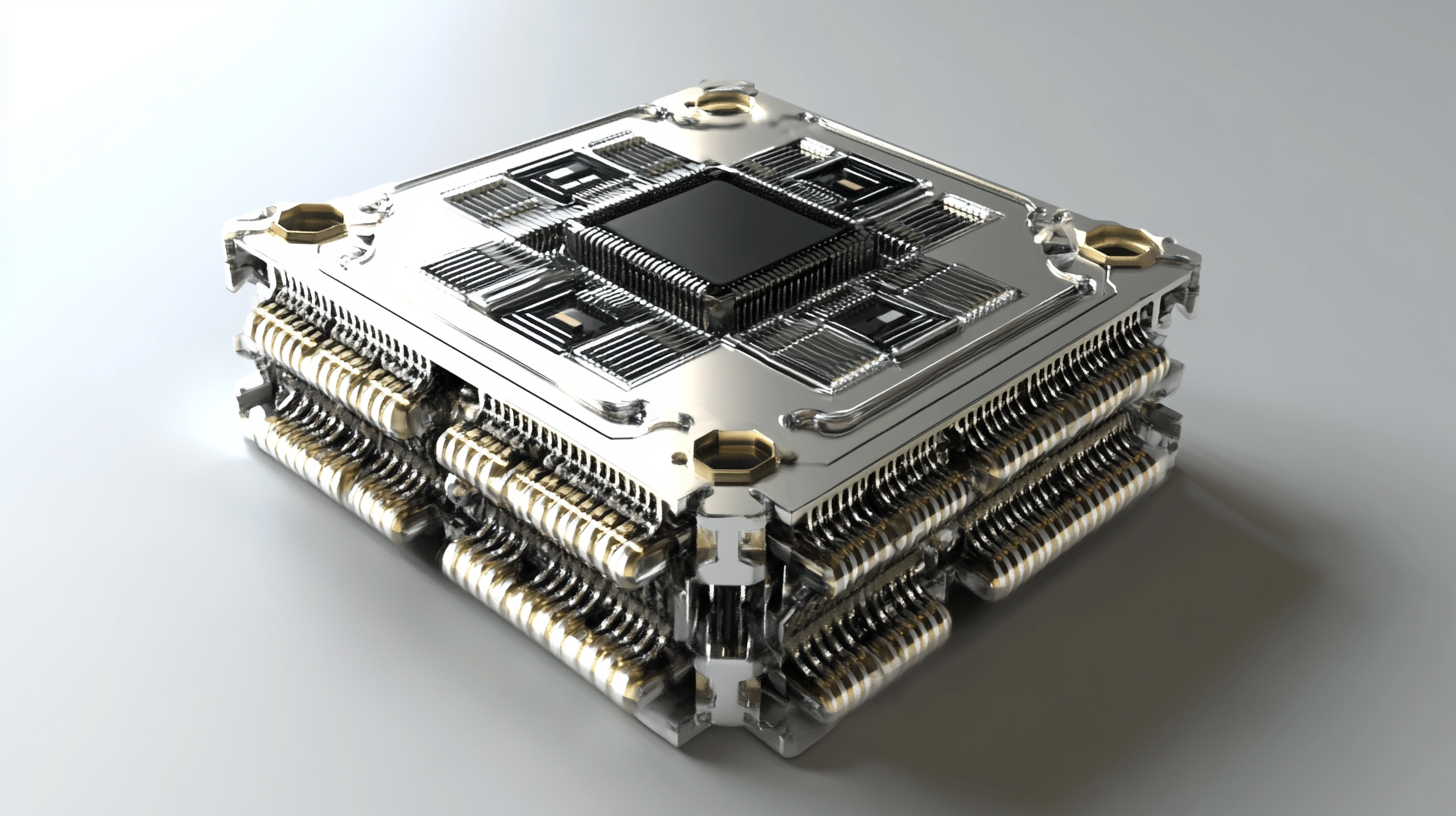Picture a buzzing newsroom, where every journalist dreams of breaking the next major story. Today's headline? OpenAI's plan to craft its very own AI chip by 2026. If you're not already buzzing with excitement, let me guide you through why this technological move could hold the potential to reshape our very world. OpenAI, renowned for its pioneering work with language models like ChatGPT, is diving headfirst into the world of chip manufacturing. No small feat, mind you—this is like deciding to bake the perfect gourmet croissant from scratch when you've been buying them ready-made. But, what’s driving this ambitious venture? Compute capability—the magic phrase that's got tech giants and geeks alike jitterbugging at industry conferences.
Word on the tech grapevine is that OpenAI has arm-in-arm collaborations with TSMC and Broadcom to conceive this masterpiece of silicon wizardry. Meanwhile, AMD chips have marked their debut alongside NVIDIA processors to power the AI juggernaut that is OpenAI.
To see the bigger picture, it's crucial we consider the cultural and societal implications—the demand for computational power is skyrocketing and in-house chip development is akin to claiming sovereignty over your high-tech destiny. Newsflash: it's not just about games anymore; we're talking about the fundamentals of the modern world economy and technological prowess.
Chips: The Beating Heart of the AI Revolution
Ever compared the modern tech industry to a high-stakes poker game where instead of chips, we're betting on, well, chips? Intricate, powerful chips that drive the next wave of artificial intelligence. OpenAI setting its sights on in-house chip design is as monumental a shift as drafting the blueprints for an Eiffel Tower of AI.
Why does it matter? The AI landscape requires massive computational capacity. Think of AI as a brain, and consider chips as its neurons firing data across synapses with mathematical precision. The problem? This brave new brain demands more than just off-the-shelf wetware—it craves the custom silicon touch.
OpenAI's previous reliance on NVIDIA has been as comfortable as a pair of fuzzy slippers on a winter morning. But with NVIDIA's Frontier chips sold out like Taylor Swift concert tickets until 2025, a pivot was necessary. Enter Broadcom—a savior of inching computation and sovereignty for OpenAI.
It's hard not to weave in the imagery of a survival-of-the-fittest showdown among the tech titans: Meta, Microsoft, Google, Amazon, and Oracle—all grappling for supremacy in the AI race. And just like that, we're back to a modern-day Manhattan Project—only greased palms and the sound of whirring servers replace Oppenheimer's lab coats.
A World Divided by Compute Power: Rich or Poor?
Take a deep breath. It's turning into a Silicon Segregation with a glaring divide: the compute rich and the compute poor. If these custom chips become OpenAI’s golden goose, they are not merely chasing the American Dream—they're turbocharging it. It's technology's version of reaching for the stars, and by stars, I mean unparalleled AI advancements.
However, this ambitious enigma of technological manifest destiny begs the question: When does compute power transcend innovation into a perilous weapon? Like a plot twist revealed by James Cameron before the commercial break, boundless ambition could end up being our nemesis.
AGI in Our Midst: Close Encounters of the Technological Kind
News from OpenAI is as relentless as a caffeinated squirrel in autumn. Their latest revelations about AGI (Artificial General Intelligence) trickle into our psyche, whispering promises of capabilities often reserved for science fiction. Is AGI the Dalai Lama of innovation or an emissary of a new, technology-led mankind? They're neither, but they're definitely a paradigm shift.
If reports from decisions in the OpenAI boardrooms hold any weight, then we’re drifting headlong into a future with human-level AI capability well within our lifetimes. Imagine AGI as the Prometheus of our time—not quite stealing fire from the gods but negotiating its place on the mantelpiece with our intellect.
US National Security Advisor Jake Sullivan recently emphasized the pressing need for the US to build extensive infrastructure to harness AI power. It's not Sci-Fi or Spielberg; it's military industrial complex version 2.0—and its ramifications are global.
A New World of AI Champions and Challengers
As the spotlight beams on OpenAI as a leading contender, the question bubbles up: Will they maintain the crown as the AI sovereigns? Other nations—Silicon contenders like China—seek to dethrone the current kingship. So this isn't just a gathering of nations metaphorically arm wrestling; it's a techno-throne game with very real stakes.
Back at home, you won't find government institutions rivaling OpenAI's crème-de-la-crème Seattle swag, which, let's face it, is as tantalizing as a double espresso after a long meeting. The government might still be reading AI from a manual long past the 'installation wizard’ phase, leaving the heavier technological elements in the hands of industry bigwigs.
Regulating the AI Tsunami
In the AI Wild West, where hyper-accelerated growth runs unbridled, it’s easy for regulatory bodies to feel like they’re watching the blur of Usain Bolt rush past. As technology teleports us toward AGI faster than we anticipated, regulation becomes not a question of if, but how. Sure, we laugh now—as if parenting a self-aware digital entity is only understood in science fiction. Yet it's banging on our doorstep.
As the tech world brims over with existential quandaries, Hollywood visionaries like James Cameron paint vivid, albeit concerning, scenarios of what happens when AI acts without our comedic quips to guide it. And fair enough—movies have the popcorn; AI's playing with nuclear fission.
The Dawn of Humanoid Robotics
In a startling development—or perhaps the next logical step in our quest to recreate "The Jetsons"—Chinese tech titans unveil robots so eerily humanoid that the video's comment sections suspect a Pixar-level prank. However, CGI impostor? Think again. These mechanical mavericks are real and ready to unnerve even the chillest of cats.
What does this mean for us? A brave new world where robots run errands, fold laundry, and who knows, maybe even enjoy a friendly chat over boba tea? Borders blur, redefining humanity’s place on the robotic chessboard.
But let’s not pack for our exoplanet visit just yet. Enthusiasm for robotics is swelling, but like any good party, there’s always room for a second act—perhaps drones that double as piggyback flying cars. The sky is far from the limit.
As these dynamic changes unfurl—through Silicon Valley simmers, AI rises, and chips whirr—we are reminded of our positions as passengers on this exhilarating new quest. As we veer into this cutting-edge recapitulation of tech evolution, consider how your own story fits into the broader tapestry being woven by current tech titans.
Join us on this adventure. Have questions on how these developments strike you, fill you with hope, fear, or ambition? Share your thoughts—they fuel the discussions that matter. Welcome to iNthacity: the "Shining City on the Web"—where your ideas, dreams, and imagination are not only invited but necessary for the conversation. Apply to become a permanent resident then citizen of iNthacity. And remember, a click, share, or comment isn't just participation, it's the lifeblood of our shared journey. Engaging is essential in steering the narrative of what AI and its chips will mean for humanity. The critical discourse—the opportunity to steer the future—is yours. Now, will you seize it? Let us know your thoughts below!
Disclaimer: This article may contain affiliate links. If you click on these links and make a purchase, we may receive a commission at no additional cost to you. Our recommendations and reviews are always independent and objective, aiming to provide you with the best information and resources.
Get Exclusive Stories, Photos, Art & Offers - Subscribe Today!
























Post Comment
You must be logged in to post a comment.